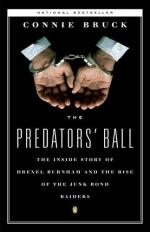
|
| Name: _________________________ | Period: ___________________ |
This test consists of 15 multiple choice questions and 5 short answer questions.
Multiple Choice Questions
1. Who were some customers who received better deals from Milken?
(a) Murdock and Turner
(b) Carl Icahn and Samuel Heyman
(c) Oscar Wyatt and Coastal Corporation
(d) Perelman and Rocho
2. In what was Atlantic Capital involved?
(a) forging bond documents
(b) selling bond coupons
(c) unmonitored investments
(d) ponzi schemes
3. Before Sigoloff switched to Drexel, who was handling his takeover bid for Wickes?
(a) Merrill Lynch
(b) Morgan Stanley
(c) Salomon Brothers
(d) Lehman Brothers
4. What had been Perelman's greatest acquisition before Revlon?
(a) Cinemascope
(b) Technicolor
(c) Todd-a-o
(d) NBC
5. For whose benefit were most of the investment partnerships?
(a) for the Drexel firm
(b) for potential clients
(c) for the corporate employees
(d) for Milken
6. Where was most of Drexel's money made through investment partnerships?
(a) in Paris
(b) in Beverly Hills
(c) in Tokyo
(d) in New York
7. Why was Revlon attracting raiders?
(a) The company's stock was trading below its breakup value.
(b) Some were trying to take advantage of the death of Charles Revson.
(c) The company was getting larger every year.
(d) Its stock was steadily growing.
8. Who told Perelman that Revlon was not for sale?
(a) Tubby Burnham
(b) Michael Bergerac
(c) Michael Milken
(d) Carl Icahn
9. What did Milken want at work?
(a) to run the Drexel firm
(b) his photo in the annual report
(c) fancy titles and gold letterhead
(d) distance between him and the powers that be at Drexel
10. What was the largest bankruptcy in 1986?
(a) Revlon
(b) LTV Corporation
(c) Metromedia
(d) TWA
11. What indicated the level of fear at Drexel during the investigations?
(a) Joseph resigned as CEO.
(b) Many employees were leaving the firm.
(c) Drexel began firing employees.
(d) All bonuses were cancelled.
12. What was another company Wedvick used in his investment scheme?
(a) Banco de Mexico
(b) Caribbean Investment Corporation
(c) Kansa General Insurance Company in Helsinki, Finland
(d) Barzil International Insurance
13. What was Perelman planning to do when he took over Pantry Pride in 1985?
(a) to use Pantry Pride and its income sheltering tax loss to acquire Revlon
(b) to run the business and get out of doing takeovers
(c) to create positions for his sons and other family members.
(d) to make Pantry Pride attractive to other supermarkets
14. What are two other notable takeovers done by Perelman after Revlon?
(a) CPC International and Transworld Corporation
(b) Warner Brothers Studios and Coca Cola
(c) Hearst Corporation and Ford Motor Company
(d) NBC-TV and Hertz Rent a Car
15. What was Drexel able to do that made it so successful?
(a) to get around banking laws
(b) to hear about acquisitions before anyone else
(c) to avoid reporting many of the transactions
(d) to place the unsecured debt that banks wouldn't touch
Short Answer Questions
1. What is it called when one investor holds stock for another investor and thus conceals the identity of the owner?
2. Who made the contact for Wedvick with Kansa?
3. How did Milken's unit function within the larger firm?
4. What concept did Milken continue to support?
5. On May 12, 1986, who was charged with insider trading and agreed to cooperate with the government?
|
This section contains 523 words (approx. 2 pages at 300 words per page) |

|




